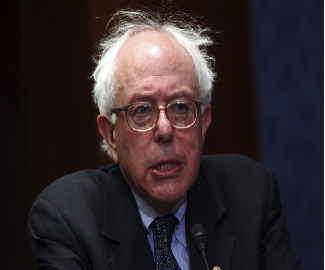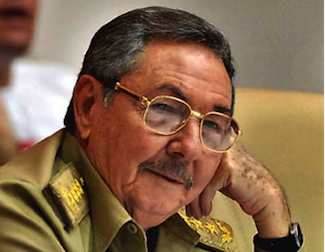Editor’s Note: This two-act play takes off from the recent decision by President Obama to restore U.S. diplomatic relations with Cuba. Raul Castro, Fidel Castro’s brother, is president of the Council of State of Cuba. Bernard Sanders, who grew up in Brooklyn, N.Y., and is a self-described democratic socialist, is a U.S. senator from Vermont. The author is a resident of Vermont; Jefferson Parish is a nom de plume.


Scene one, Presidential office of Raul Castro, in Havana, Cuba, sometime in 2015.
Bernard Sanders enters, followed by an aide and two press photographers.
Sanders: [In a 1950’s Brooklyn accent] Hello, Mr. President.
Castro: Hello Bernie, ah, Mr. Ambassador. This is an historic occasion.
Sanders: Yes it is, Mr. President. Our president sends his regards and best wishes and asked me to say:
Buenos Dias, El Presidente.
Castro: Very good! When you return you can tell him this for me:
Go Yankees!
[Castro chuckles at his joke.]
[The two men shake hands, as the press photographer records the occasion. They then sit.]
Sanders: Mr. President…
Castro: Please call me Raul. If you don’t mind I’ll call you Bernie.
Sanders: Of course. Everyone does. Now Raul, our president…=
Castro: Barack….
Sanders: Yes, Barack and I believe it is in the best interest of our respective countries that the over-50-year-old U.S. trade embargo of Cuba be ended and free trade resume. But that requires approval by our Congress. And Congress needs some assurances from you.
Castro: Can I offer you a cigar, Bernie?
Sanders: Sure. But aren’t we in a smoke-free zone? Where I live in Vermont, you can’t even smoke in the city park.
Castro: No problemo here, Bernie. I make the rules.
Sanders: OK. [He lights up, takes a puff, then looks at the cigar.] The red band is nice touch. Now, as I was saying, Congress needs some assurances….
Castro: Such as….
Sanders: [Making sure that the photographer is filming, he removes a card from his pocket and begins reading.]
That Cuba will respect freedom of expression, religion and association; that American investors will be repaid for expropriated property; that people will be entitled to pursue life, liberty and pursuit of happiness; that you will allow political parties; that you will empty your prisons of political prisoners and renounce state-sponsored terrorism; that you will export rum and cigars to America; and that our hotels and casinos will be welcomed.
Castro: You ask for a lot, Bernie. You should be glad my brother is not here. He’d send you a fastball high and tight and shout,
“Yanqui, go home!”
Sanders: Actually, Raul, I grew up in Brooklyn and rooted for the Dodgers against the Yankees.
Castro: Ah yes. Well my wife went to MIT and rooted for the Red Sox. But you didn’t actually want Yankees to go home, did you? [chuckling] Well, we do need some new trading partners with the oil business in the crapper, so let’s discuss this more in private, si?
Sanders: Si, I mean yes, Raul. [Turning to his aide and the photographers] Will you excuse us? [They leave.]
Scene two. Same office but the two are now alone.
Castro: Hey, Bernie, where did you learn the secret socialist handshake?
Sanders: I read about it once in a book about Che, and a few years ago tried it out on Hugo at a meeting in Caracas with Joe Kennedy and his home-heating-oil company. It’s tricky to make each digit the same size and minimize the importance of the thumb. I don’t think that the press boys noticed.
Castro: Do you want me to have them arrested and find out?
Sanders: No, no [trying to smile]. Not today at least. Did you like my speech?
Castro: Well, I admired the apparent conviction. It can’t have been easy for a socialist to say. But there’s an old Spanish idiom that translated goes something like this: “You fuck the chicken if you must.” Which reminds me, how did you get Barack to appoint you ambassador?
Sanders: I learned long ago that the way to get what you want is to make yourself a pain somewhere else. I enjoyed being a senator but I wasn’t getting anywhere. So I started rumors about a presidential run of my own. Did you read about it?
Castro: Sure. I get Burlington’s Seven Days. The Bernie Beat’s terrific.
Sanders: Well, I was making the Clinton/Cuomo/Warren people nervous. They figured I couldn’t pass up this gig. The same thing happened in Vermont when I threatened to run for governor. Voila, I became a congressman!
Castro: Nice. But aren’t people afraid you’ll give away the store down here?
Sanders: Let me put it to you this way. [Taking another drag on his cigar.] We, that is, the CIA, have tons of money. I mean tons and tons and tons of it. Just look what we spent in Iraq and Afghanistan. If you’ll just relax on a few of the smaller things I talked about (like letting Caesar’s Palace into Havana and letting Catholics attend church regularly), money will go wherever you want it to…Cuba, the Caymans, Kremlin, Swiss banks, Vermont, wherever.
Castro: But La Revolution? Fidel’s vision of compete equality? Che’s legacy?
Sanders: [Looking around] Are we truly alone here, Raul?
Castro: Si, senor. But this is the only place.
Sanders: Now here’s the thing. You’ve got to look at the big picture. If you soft-pedal a few of these socialist ideas, for which we will pay you richly, I will work with you to push the big ideas to our country. We can go on a speaking tour. Havana may become like Miami, but America will become like your Cuba.
[He high-fives Raul.]
Castro: [Pausing for a while] Che would be impressed, El Bernardo. Is Barack on board?
Sanders: Si, El Presidente. It was his idea to begin. But he insists you open a golf course.
Castro: I suppose we could do that. How else do we start?
Sanders: In the north, in the snow, in Vermont in fact.
Castro: Brrr. Would I have to go there?
Sanders: No (though you’d be warmly received), but some of that money coming your way would. The idea is to make Vermont the model of the new U.S. free health care, complete income redistribution, more government programs. You know, socialism. We’re about half way there now; we just need some money to finish it. Then it is, “as Vermont goes, so goes the nation.”
Castro: You’ve got quite a vision there, Bernie.
Sanders: My friends aren’t called Sanderistas for nothing!
Castro: But how am I going to back away from our revolutionary goals? My party will be sorely disappointed.
Sanders: Not if you do what I did, Raul, and the steps are pretty simple.
One, blast the rich whenever and wherever you can. It matters less what you do than what you say you are going to do. That is the first rule of my politics.
Castro: But we don’t have any rich here, except us.
Sanders: Oh yeah. Then on to step two. Speak up for the little guy, whenever and wherever. Again, talking is more important than doing.
Castro: We do that now.
Sanders: Third, always, always support the veterans. If you support the vets, you win over or at least neutralize the army. And with the army on your side, business won’t oppose you.
Castro: We don’t have any business here either.
Sanders: How lucky! But in sum, if you say Viva la Revolution over and over and make sure the vets get a pension, you’ll win every election and be able to do pretty much whatever you want. Get it?
Castro: We don’t have real elections down here, Bernie. And I already do what I want. Nevertheless, I think all this is going to work out very well. Why don’t we have a swig of rum from my in-laws’ pre-revolution distillery to toast the people. And then we can call Hugo with the good news.
Sanders: Okay, but one more thing before I leave. I really like your hair. Who’s your barber?
#


